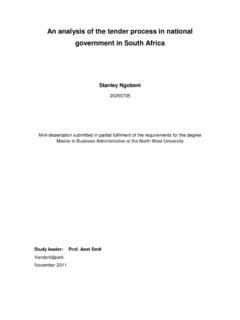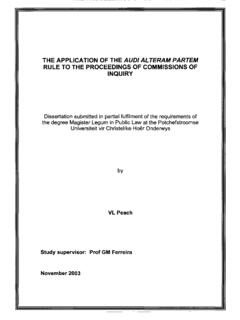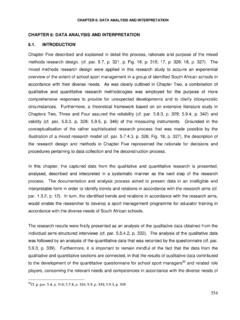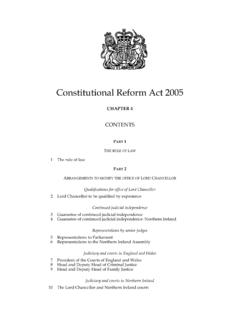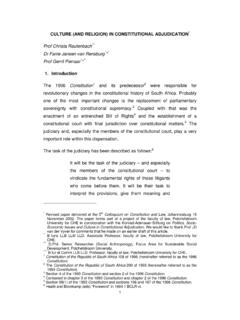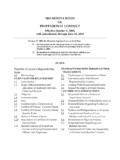Transcription of Sidumo v Rustenburg Platinum: Impact on disciplinary ...
1 Sidumo v Rustenburg platinum : Impact on disciplinary hearings in the workplace Dissertation submitted in partial fulfilment of the requirements of the degree Magister Legum in Labour Law at the North-West University (Potchefstroom Campus) by Sandra Labuschagne 21382972 Study leader: Adv P Myburgh Assistant study leader: Miss A Botes May 2011 INDEX Summary Key words Opsomming List of abbreviations 1. Chapter 1 Introduction 2. Chapter 2 ii iii iv 1 2 2 7 "Reasonable employer" versus "reasonable decision maker" 7 The "reasonable employer"-test 7 The "reasonable decision maker"-test 19 3. Chapter 3 33 The Impact of the Sidumo -case on disciplinary hearings in the workplace 33 4. Chapter 4 42 Conclusion and recommendations Bibliography 42 47 Sidumo v Rustenburg platinum : Impact on disciplinary hearings in the workplace Summary Prior to the constitutional Court's decision in the Sidumo and another v Rustenburg platinum Mines Ltd and others (2007) lACC 22 the Commission for Conciliation Mediation and Arbitration applied the "reasonable employer"-test to determine whether a specific sanction, issued by an employer, was fair.
2 The "reasonable employer"-test provided a lot of flexibility to employers to dismiss employees for misconduct, as employers' decisions to dismiss were "protected" from scrutiny by the CCMA. The constitutional Court replaced the "reasonable employer"-test, which required a measure of deference to the decision of the employer, with that of the "reasonable decision maker"-test, which required an answer to the question whether the decision reached by the commissioner was one that a reasonable decision maker could not reach? This meant that in the event that the decision reached by the commissioner was one that a reasonable decision maker could not reach, that the decision of the commissioner will be overturned on review.
3 The change in test from a "reasonable employer" to that of a "reasonable decision maker" had significant implications for employers who are instituting disciplinary action against their employees and subsequently imposing the sanction of dismissal, as commissioners are no longer allowed to "defer" to the decision imposed by employers. The Sidumo test also have implications for employers who are seeking to take decisions of the CCMA on review, as londo JP held in Fidelity Cash Management Service v CCMA 2008 29 ILJ 964 (LAC) that it will not be often that an arbitration award is found to be one that a reasonable decision maker could not have made. ii Key words sanction; reasonable employer-test; reasonable decision maker-test; disciplinary hearings; substantive fairness; procedural fairness; discipline; employment relationship; defer(ence); review iii Sidumo v Rustenburg platinum : Impak op dissiplinere verhore in die werksplek Opsomming Voor die Konstitusionele Hof se beslissing in Sidumo en 'n ander v Rustenburg platinum Mines Ltd en andere (2007) ZACC 22 het die Kommissie vir Versoening, Bemiddeling en Arbitrasie die "redelike werkgewer"-toets gebruik am te bepaal of 'n spesifieke sanksie, soos toegepas deur 'n werkgewer in 'n dissiplinere verhoor, billik was.
4 Die "redelike werkgewer"-toets het baie vryheid aan werkgewers verleen om werknemers te ontslaan weens wangedrag, omdat hul besluit grotendeels "beskerm" was teen inmenging van die KVBA. Die KH het die "redelike werkgewer"-toets, wat 'n mate van respek vir die beslissing van die werkgewer vereis het, vervang met die "redelike besluitnemer"-toets wat 'n antwoord op die vraag: "was die besluit van die kommissaris, een wat 'n redelike besluitnemer kon gemaak het?", vereis het. Oit beteken dat as die besluit wat deur 'n kommissaris geneem is, nie een is wat deur 'n redelike besluitnemer geneem kon word nie, die besluit op hersiening omgekeer sou word. Die "redelike besluitnemer"-toets wat nou deur die howe toegepas word, het 'n groot impak op werkgewers wat dissiplinere aksie teen hul werknemers wil neem, omdat kommissarisse nie meer gebonde is of respek moet betoon aan die besluite van werkgewers nie.
5 Die Sidumo -toets het ook implikasies vir werkgewers wat graag die besluite van die KVBA op hersiening sou wou neem omdat, soos Zondo RP tereg opgemerk het in Fidelity Cash Management Service v CCMA 2008 29 ILJ 964 (AH), dit nie gereeld sal gebeur dat 'n beslissing deur die KVBA een sal wees wat nie deur 'n redelike besluitnemer geneem kon gewees he! nie. iv LIST OF ABBREVIATIONS CC CCMA ILJ LAC LC LRA SA Merc LJ SASLAW SCA constitutional Court Commission for Conciliation, Mediation and Arbitration Industrial Law Journal Labour Appeal Court Labour Court Labour Relations Act 66 of 1995 South African Mercantile Law Journal South African Society for Labour Law Supreme Court of Appeal 1 Chapter 1 Introduction Prior to Sidumo v Rustenburg platinum Mines Ltd1 the Commission for Conciliation, Mediation and Arbitration2 applied the "reasonable employer"-test to determine whether a specific sanction, which was issued by an employer, was fair.
6 In Nampak Corrugated Wade ville v Khoza3 the Labour Appeal Court4 held that the determination of a fair sanction lies largely within the discretion of the employer, that this discretion should be exercised fairly and that a court should not lightly interfere with the sanction imposed by the In Country Fair Foods (Pty) Ltd v CCMA6 the LAC went so far as to find that there should even be a measure of deference? to the sanction imposed by the In other words, the arbitrator has to consider the matter from the perspective of the employer. According to Landman, one of the explanations for deference to a decision maker's decision was that "the decision maker under review has more expertise about the subject matter than courts of law,,9 In such a case, the employment tribunal is best equipped to make a decision based on its employment experience and knowledge of prevailing Interference with the sanction imposed by the employer should only be justified when the sanction imposed was unfair or when the employer acted unfairly when imposing the The commissioner would however have a duty to interfere with the 1 2007 ZACC 22 (hereafter the Sidumo -case).
7 2 Hereafter CCMA. 3 1999 20 fLJ 578 (LAC) (hereafter the Nampak-case). 4 Hereafter LAC. 5 1999 20 fLJ 578 (LAC) 32A-33B. 6 199920 fLJ 1707 (LAC) 28A-28B (hereafter the Country Fair Foods-case). 7 For a study on the term "deference", see Landman 2008 fLJ 1613-1618. 8 199920 fLJ 1707 (LAC) 28A-28B; Cohen 2003 SA Merc LJ 205; Grant 2009 Obiter 760. 9 Landman 2008 fLJ 1615. 10 Smit 2008 fLJ 1637. 11 1999 20 fLJ 1707 (LAC) 30A. 2 sanction imposed by the employer, if the sanction is so excessive to "shock one's sense of fairness".12 However, this line of thinking was rejected by the constitutional Court in the Sidumo -case and replaced with the test: "is the decision reached by the commissioner one that a reasonable decision-maker could not reach?
8 ,,13 The rejection of the "reasonable employer"-test in favour of a "reasonable decision maker"-test might have significant implications for employers who are instituting disciplinary action against their employees and subsequently imposing the sanction of dismissal, as commissioners are no longer allowed to "defer" to the decision imposed by In Shoprite Checkers (Pty) Ltd v Sebotha N015 Francis J held, with regard to the Impact the Sidumo -case would have on discipline in the workplace, that: 16 there are various prophets of doom about what would be happening to discipline in the workplace. Some employers were able to dismiss employees on the basis of the reasonable employer's test. Most chairpersons of disciplinary enquiries endorsed employers' decisions without any fail (sic).
9 Commissioners are not there to rubber stamp decisions taken by employers. The Sidumo -test might also have implications for employers who are seeking to take decisions of the CCMA on review, as Zondo JP held in Fidelity Cash Management Service v CCMA 17 that "it will not be often that an arbitration award is found to be one that a reasonable decision maker could not have made".18 The purpose of this mini-dissertation is therefore to consider what Impact the Sidumo v Rustenburg platinum -case has on disciplinary hearings in the workplace as a result of the criteria set to review awards made by commissioners. This will be done 12 1999 20 ILJ 1707 (LAC) 30A; Cohen 2003 SA Mere LJ 199. 13 2007 ZACC 22110. 14 2009181R Network (LC) 21.
10 15 2009 18 IR Network (LC) (hereafter the Sebotha-case). 16 2009 18 IR Network (LC) 21; see also Myburgh 2010 ILJ 19-20. 17 2008 29 ILJ 964 (LAC). 18 Myburgh 2009 ILJ 2; see also comments by Smit 2008 ILJ 1643. 3 through a literature study by using books, legislation, court decisions, conference papers and journal articles. The law regulating unfair dismissals is the Labour Relations Act,19 as amended, which determines that a dismissal would be unfair if the employer fails to prove that the reason for the dismissal relates to, amongst other issues, the employee's The employer must further prove that the dismissal was effected in terms of a fair procedure21 Section 188 of the LRA further requires from any person who needs to determine the fairness of a dismissal to take into account the relevant code of good practice22 issued in terms of the LRA.
